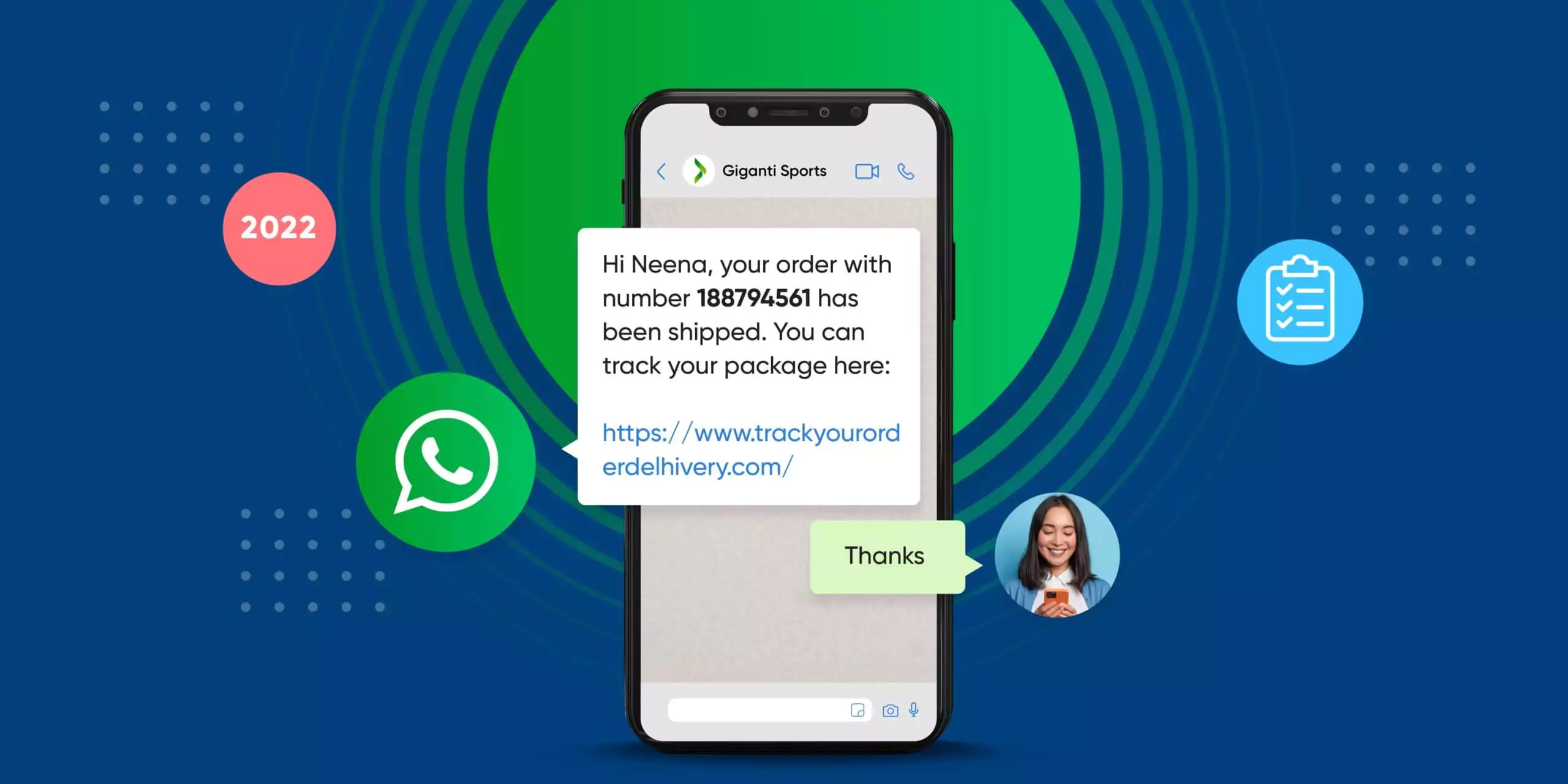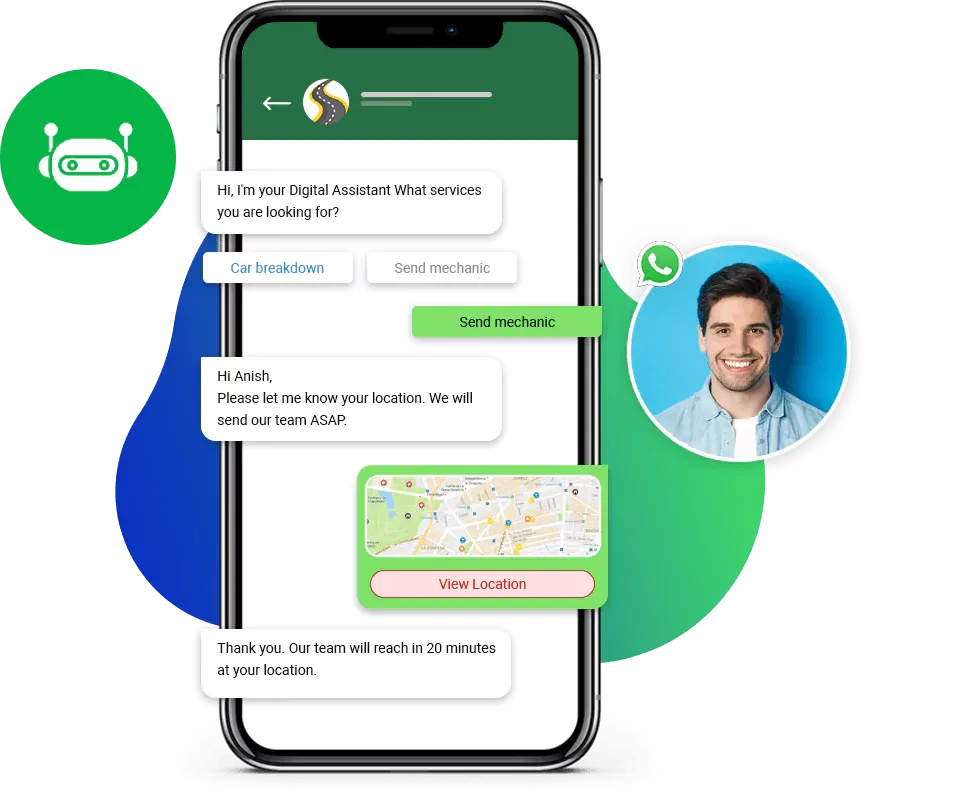Introduction
WhatsApp has become deeply entrenched in all aspects of society, including education.
Recent surveys show 93% of students believe WhatsApp helps them learn better (MIC, 2021). With mobile messaging now an integral part of learning processes, leveraging WhatsApp’s ubiquity and accessibility can transform education delivery and support.
Specifically, AI-powered WhatsApp business chatbots on WhatsApp provide myriad opportunities to enhance and personalize education.
It allows educators to drive higher engagement, feedback and learning outcomes across student groups. The impacts also extend to administration, with chatbots streamlining admissions, fees processing and other workflows for institutions.
As per Juniper Research, integrating conversational AI like chatbots in education can yield cost savings up to $11 billion globally by 2023 (THE Journal, 2021). With education going increasingly online and mobile, AI-led WhatsApp chatbots provide the right mix of accessibility, interactivity and intelligence for 21st century learning.
So, buckle up, and let's dive into the world of WhatsApp business chatbots that will elevate your business to new heights!
What are WhatsApp chatbots?
WhatsApp business chatbots have revolutionized the way we interact and engage with technology. These intelligent virtual assistants are designed to simulate human conversation and provide automated responses.
WhatsApp business chatbots can understand and respond to user queries, carry out tasks, and offer personalized experiences.

Definition and functionality of chatbots
WhatsApp business chatbots are software programs that use artificial intelligence (AI) algorithms to understand and respond to natural language inputs from users. They can interpret text-based messages and provide appropriate replies, making them ideal for communication on platforms like WhatsApp.
How do WhatsApp business chatbots work?
They function by integrating with the WhatsApp platform's API (Application Programming Interface). Through this integration, chatbots can send and receive messages, access user data, and perform various actions based on predefined rules and algorithms.
Why are WhatsApp business chatbots beneficial for education?
The use of WhatsApp chatbots in education has gained momentum due to their numerous benefits and positive impact on the learning experience, like:

Enhanced accessibility and convenience
WhatsApp business chatbots enable students to access educational resources and support anytime, anywhere. WhatsApp business chatbots eliminate geographical barriers and time constraints. Thus allowing learners to engage with educational content at their own pace and convenience.
Personalized learning experiences
By leveraging data analysis and machine learning, WhatsApp chatbots can deliver personalized learning experiences tailored to each student's needs. WhatsApp business chatbots can provide customized recommendations, suggest relevant resources, and offer targeted feedback to enhance the learning process.
Instant and interactive communication
WhatsApp business chatbots facilitate real-time and interactive communication between students, teachers, and educational institutions. WhatsApp business chatbots enable seamless information sharing, quick access to updates, and instant clarification of doubts. It fosters a collaborative learning environment.
When and where to use WhatsApp business chatbots in education?
WhatsApp business chatbots can be deployed in various educational scenarios, like:
Classroom support and engagement
In the traditional classroom setting, WhatsApp chatbots can serve as valuable assistants. They can provide supplementary materials, answer frequently asked questions, and engage students in interactive discussions and activities to reinforce learning concepts.
Virtual tutoring and mentoring
With the rise of online learning, WhatsApp chatbots can act as virtual tutors or mentors. They can guide students through lessons, offer personalized study plans, and provide additional explanations and examples to ensure a comprehensive understanding of the subject matter.
Administrative tasks and support
Administrative tasks can be time-consuming for educational institutions. WhatsApp chatbots can automate routine administrative processes, such as scheduling appointments, sending reminders, and providing general information. This frees up valuable time for educators and staff to focus on more critical tasks.
How do WhatsApp business chatbots improve student engagement
WhatsApp business chatbots have proven to be effective tools for enhancing student engagement and motivation in the learning process.
Interactive quizzes and assessments
WhatsApp business chatbots can deliver interactive quizzes and assessments directly to students' devices. By gamifying the learning experience, they encourage active participation and provide instant feedback. Thus making the process of learning more enjoyable and engaging.
Gamification and rewards for learning
Integrating gamification elements into educational activities through WhatsApp chatbots can incentivize students to actively participate and achieve learning goals. WhatsApp business chatbots can earn points, badges, or rewards for completing tasks, reaching milestones, or demonstrating progress. This might foster a sense of achievement and motivation.
Real-time feedback and progress tracking
WhatsApp business chatbots enable real-time feedback on students' performance and progress. WhatsApp business chatbots can provide detailed insights into areas of improvement, track learning milestones, and offer personalized recommendations for further development. It empowers students to take ownership of their learning journey.
The Impact of WhatsApp Business Chatbots on Teacher Productivity
WhatsApp business chatbots have emerged as a game-changer in the field of education. Let's explore some of the key ways in which WhatsApp chatbots impact teacher productivity.
Automated Administrative Tasks
One of the primary advantages of WhatsApp chatbots is their ability to automate administrative tasks. Teachers often find themselves overwhelmed with paperwork, attendance management, and other repetitive administrative duties that eat up precious time. With chatbots, these tasks can be efficiently handled without manual intervention.
WhatsApp business chatbots can generate automated reports, mark attendance, and manage student records, freeing up valuable time for teachers to focus on core teaching activities. By reducing the administrative burden, WhatsApp chatbots streamline processes and enable teachers to allocate their energy toward meaningful engagement with students.
Personalized Feedback and Grading Assistance
Providing timely and personalized feedback is essential for student growth and learning.
However, with large class sizes and limited time, it becomes challenging for teachers to provide individual attention to each student. WhatsApp business chatbots come to the rescue by offering personalized feedback and grading assistance.
Through intelligent algorithms, WhatsApp business chatbots can assess student work, provide instant feedback, and even assist in grading assignments. This personalized approach not only saves time but also ensures that students receive immediate feedback. It enables them to understand their strengths and areas for improvement.
Efficient Communication with Students and Parents
Communication plays a vital role in education, fostering collaboration and engagement between teachers, students, and parents. WhatsApp chatbots act as efficient communication channels, enabling seamless interaction among all stakeholders.
Teachers can send important updates, assignments, and reminders through chatbots, ensuring that students and parents stay informed.
Additionally, chatbots can answer frequently asked questions, reducing the need for repetitive explanations. This streamlined communication process saves time and enhances overall productivity.
Case Studies: Successful Implementation of WhatsApp Chatbots in Education
Let's dive into some real-world examples that showcase the successful implementation of WhatsApp chatbots in education.
Example 1: Improving Language Learning with Chatbots
In a language learning institution, a WhatsApp chatbot was implemented to enhance the learning experience.
The chatbot engaged students in interactive conversations, offering personalized language practice, vocabulary quizzes, and grammar exercises. It also provided instant feedback, helping students strengthen their language skills.
As a result, students showed improved language proficiency. And teachers could focus on individualized instruction rather than spending excessive time on repetitive language exercises.
Example 2: Enhancing Virtual Classrooms through Chatbot Integration
In the wake of the COVID-19 pandemic, many educational institutions shifted to virtual classrooms. They played a crucial role in enhancing the virtual learning experience.
They facilitated seamless communication between teachers and students, provided technical support, and addressed common queries.
By automating administrative tasks, such as sharing class schedules and assignments, chatbots allowed teachers to concentrate on delivering high-quality online instruction.
Challenges and Considerations in Implementing WhatsApp Chatbots
While WhatsApp chatbots offer numerous benefits, there are certain challenges and considerations that educational institutions need to address.
Privacy and Data Security Concerns
As chatbots handle sensitive student information, privacy, and data security become paramount.
Educational institutions must ensure that appropriate security measures are in place to protect student data. Compliance with data protection regulations and clear communication about data handling practices are essential to build trust and address concerns.
Customization and Maintenance Requirements
Implementing WhatsApp chatbots requires customization to align with specific educational goals and processes.
Institutions must invest time and effort in tailoring chatbot functionalities to meet their unique requirements. Additionally, regular maintenance and updates are necessary to keep the chatbots running smoothly and adapt to changing needs.
Training and Support for Teachers and Students
Teachers and students need proper training and ongoing support to effectively use WhatsApp chatbots.
Institutions should provide comprehensive training sessions, instructional materials, and readily available support channels. This ensures that teachers and students can maximize the benefits of chatbot integration and overcome any technical or usability hurdles.
How to Implement WhatsApp Chatbots in Educational Institutions?
Implementing WhatsApp chatbots in educational institutions requires a systematic approach. Here's a step-by-step guide:

Identifying Specific Goals and Use Cases
Begin by identifying specific goals and use cases for chatbot implementation. Determine the administrative tasks that can be automated, the communication gaps that need to be filled, and the areas where personalized feedback and assistance are crucial.
Choosing the Right Chatbot Platform
Select a chatbot platform that aligns with your institution's requirements. Consider factors such as ease of integration, customization options, security features, and scalability. For instance, BotPenguin WhatsApp chatbot for education provides 60+ integrations and latest security features.
Conduct thorough research, read user reviews, and consult with experts before making a decision.
Integrating Chatbots with Existing Systems and Tools
Successful implementation involves integrating chatbots with existing systems and tools. This includes seamless integration with student information systems, learning management systems, and other relevant platforms. Ensure that data flows smoothly between these systems and the chatbot for efficient operations.
Conclusion
In conclusion, WhatsApp business chatbots have diverse applications to enhance multiple facets of education - from learning to optimizing administrative processes.
Recent projections predict that intelligent chatbots will reduce dropout rates in online education by over 65% in the next 5 years (ReportLinker, 2022). By providing instant, personalized support, chatbots increase student motivation and academic success.
Additionally, conversational AI market spend in education is estimated to grow at a CAGR of 17% through 2028 (Transparency Market Research, 2022). Solutions like BotPenguin enable educators to cost-effectively harness chatbots' engagement and analytical capabilities.
Offering easy bot building interfaces, analytics dashboards and seamless LMS integrations, BotPenguin empowers institutions to track student progress and streamline workflows. Institutions can also leverage user input analysis to refine teaching methods and content. With customized regional language bots, BotPenguin allows similar impactful initiatives to be swiftly deployed at scale.
Overall, as education goes increasingly online and mobile-first, leveraging the personalized support and intelligence of WhatsApp chatbots is proving vital for educators worldwide. With versatile platforms from players like BotPenguin, unlocking the power of conversational AI to advance learning is now quicker and easier than ever before.
Frequently Asked Questions (FAQs)
How can WhatsApp chatbots enhance learning experiences for students?
Chatbots act as AI tutors for personalized teaching, send study reminders and notes, recommend resources, clarify doubts 24/7 and make learning interactive via quizzes, facilitating better outcomes.
In what ways can WhatsApp chatbots assist educators and academics?
Chatbots automate administrative tasks like attendance management, assignment collections and scheduling to save time while allowing lecturers to focus on delivering high-quality teaching.
How do WhatsApp chatbots make educational institutions more efficient?
Chatbots streamline admissions management via document handling, fee payments and query resolution to reduce operational costs for colleges and universities significantly.
How can WhatsApp chatbots bridge gaps in education access?
Bots tackle challenges like teacher shortages and infrastructure deficits by providing on-demand, inclusive virtual support accessible easily via WhatsApp messaging.
How do WhatsApp chatbots encourage student participation?
Through techniques like personalized notifications, motivational tips and gamification elements, chatbots continually stimulate active progress tracking and collaboration.
Can WhatsApp chatbots adapt for students with special needs?
Yes, capabilities like audio notes, visual aids and customized recommendation engines allow tailoring WhatsApp chatbot experiences for neurodiverse student groups as well.
Are WhatsApp education chatbots effective across age groups?
From primary grades to adult learners, studies show WhatsApp chatbots uplift results for students of all ages by enabling personalized guidance at scale.


